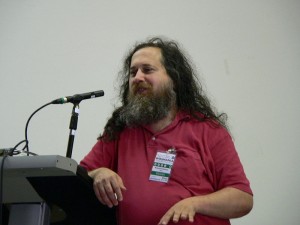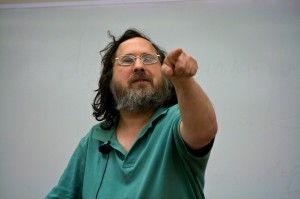Long before Snowden, Richard Stallman warned of the surveillance state to little effect, a Cassandra of the Cloud. In “Why You Should Not Use Uber,” he continues to rail against a new machine he sees as soulless. An excerpt follows.
____________________________
• It requires you to let Big Brother track you, with a portable phone.
- Uber requires you to identify yourself, both to order a cab and to pay.
- Uber also records where you get the cab and where you go with it.
- The US government can get those records, and any lawsuit (such as a divorce lawsuit) can subpoena them.
- Uber’s clever policy of not being directly responsible for anything that goes wrong extends to harassment by drivers, and its practice of identifying passengers enables drivers to find out who the passenger is. This makes some women scared to use Uber.This problem comes directly out of the practices listed above that mistreat all users of Uber.
- Uber is an unregulated near-monopoly, so it can cut rates for drivers arbitrarily.
Drivers are starting to complain that they’re left with little money for their work.
Uber drivers are getting shafted; Uber can arbitrarily cut their pay, and they have to work 15 hours a day. Some are trying to unionize.
We should not accept the whitewash label of ‘sharing economy’ for companies like Uber. A more accurate term is ‘piecework subcontractor economy.’
It would be easy for a non-plutocratic government to prohibit this, and that’s what every country ought to do, unless/until every person gets an adequate basic income so people don’t need to be employed.•



